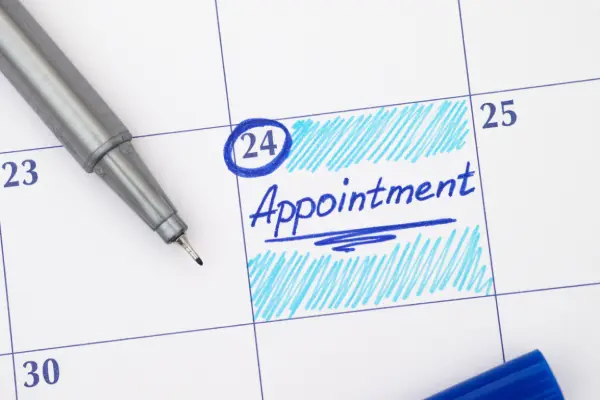
In California, how do I register my vehicle?
We can show you how to renew or register your vehicle for the first time, regardless of whether you already own a car, recently purchased a new one, or are moving to California.
How to register your car in California is as follows:
- Visit the DMV branch in your neighborhood.
- Display a smog certificate and ownership documentation.
- Please present identification and proof of auto insurance.
- Application for Title or Registration' (Form REG 343) must be completed.
- Pay the required fees, which include the $65 registration fee, the $29 California Highway Patrol (CHP) fee, the $19 transportation improvement fee, the $13 title fee, and any applicable taxes.
Please refer to the information below for more details.
What Takes Place If I Purchase a Car from a California Car Dealership?
A car dealership typically takes care of all the registration paperwork on your behalf when you purchase a vehicle from them. Until your official registration arrives from the California DMV, they will give you a temporary registration certificate to keep in your car. It's a good idea to inquire with your dealership about their specific procedure because they may vary in terms of whether or not they offer license plates.
What if I purchase a car in California from a private seller?
If you purchase your vehicle from a private party, you have ten days to register it. To do this, visit your neighborhood DMV office (make an appointment online or by calling (800) 777-0133), and then:
- Give the title to the car, which, if it is less than 20 years old, should show the mileage on the odometer.
- Fill out a "Application for Duplicate or Paperless Title" (Form REG 227) if you can't find the title.
- Display a current smog certificate. The seller must give you this document if the vehicle is older than eight years.
- After inspection, smog certificates are good for 90 days. Before you register the car, make sure the certificate won't expire.
- If the previous owner renewed the registration within 90 days of the vehicle sale and renewed it for a period of two years, you are exempt from needing the smog certificate.
- Send in a "Application for Title or Registration" (Form REG 343) that has been properly filled out.
- Pay all required registration fees and taxes (see below under "Registration Fees").
How Can I Convert a Non-Transferable Registration in California to a Transferable Registration?
Vehicles from other states that are registered in California without a title or other evidence of ownership are given a non-transferable registration. No California vehicle title may be issued to such vehicles, nor may they be sold or transferred. You must change a vehicle's non-transferable registration into a transferable registration if you want to buy or sell it.
Here's how to change your California registration from a non-transferable to a transferable one. You must deliver the following documents to your nearby California DMV office:
- Your current registration card, which is not transferable.
- The most recent title for the vehicle.
- If your vehicle was originally titled in California and you don't have the title, fill out a "Application for Duplicate or Paperless Title" (Form REG 227) or get in touch with the DMV.
- If you are purchasing and registering a vehicle from the previous owner, you will also need a Bill of Sale and a "Application for Title or Registration" (Form REG 343). A statement about the odometer for vehicles under 20 years old.
- Smog certification documentation, if necessary.
- Payment for the renewal fees if the vehicle's registration needs to be renewed within 30 days.
- Payment of any transfer fees that are applicable or unpaid citations.
What steps should brand-new Californians take to register their cars?
You must register your vehicle(s) within 20 days of moving into California if you are a new resident or a current resident who bought a car outside of the state and brought it back. Find your nearby DMV office and make an appointment to register your car first.
In California, you are regarded as a resident if you:
- Have activity in the state.
- Make a claim for a California home's tax exemptions.
- Rent or lease a place to live.
- Obtain legal documents from the state, such as a driver's license or voter registration.
- Enroll in any school (from elementary to college level) for yourself or your dependents.
- Please be advised that military personnel and their families who reside in another state are not subject to these regulations.
Visit a nearby DMV office with the following to register your vehicle in California:
- A completed "Application for Title or Registration" (Form REG 343) with the names of all owners and, if applicable, lienholder information.
- "Declaration of Gross Vehicle Weight/Combined Gross Vehicle Weight" (Form REG 4008) is required if it is a commercial vehicle.
- "Permanent Trailer Identification (PTI) Application Certification" (Form REG 4017) is necessary for trailers.
- Evidence of car insurance.
- If you're transferring your title to California, it must be an out-of-state title. This is not necessary if you are not concurrently applying for a California title, but the registration will be non-transferable if you do not.
- Out-of-state registration, a renewal of registration, or a letter indicating registration from the previous state.
- If required, weight certification.
- Certification for emissions and smog, if necessary.
- Payment of all applicable taxes and fees.
- Your car will be physically inspected by a DMV employee, who will also check the VIN. Following that, you'll get a California registration certificate, plates, and stickers for your car.
California's vehicle registration fees
When you register a vehicle in California, there are a number of fees that you must pay, and these fees can change depending on a number of factors. These costs will be added to the final price of the vehicle if you're buying it from a car dealer. The California Department of Motor Vehicles (CA DMV) will require payment of these fees if you purchase your vehicle from a private party.
The fees that each vehicle must pay are as follows:
- Cost of participation: $65.
- Transportation Improvement Fee (TIF), which is based on your vehicle's value: $29. California Highway Patrol (CHP) fee: $29.
- $0 to $4,999: $28.
- $5,000 to $24,999: $56.
- $25,000 to $34,999: $112.
- $35,000 to $59,999: $168.
- $60,000 and up: $196.
Late registration fees for vehicles
In California, you must register your vehicle within 20 days of moving in order to avoid incurring late fees that are based on how much time has passed since your registration was due. You have ten days to register a car you buy from a private seller in California before late fees kick in.
The California Vehicle Registration Penalties are as follows:
- $30 if paid in less than a year.
- 1-2 years late: $50.
- $100 if more than two years late.
The penalties assessed by the California Highway Patrol for an initial registration are the same as those assessed for registrations.
The remaining costs are determined by your car. Visit the California state website and use their California VLF calculator to get an idea of what you'll have to pay for your vehicle license fees (VLFs) if you want a more precise estimate. Be aware that you cannot register a vehicle until all fees, penalties, and debts owed to the California DMV have been settled in full.
Does My Car Need a Smog Check in California?
Yes, almost all vehicles in California must pass a smog check in order to be registered. There are a few exceptions, though. You don't need a smog check if your car is newer than four years old, a hybrid or electric vehicle, a gas or diesel vehicle manufactured in 1975 or earlier, a natural gas or diesel vehicle manufactured in 1997 or earlier, a motorcycle, or a trailer.
A $25 smog abatement fee must be paid annually for the first eight years that a new car is registered if you live in certain areas where new cars that are 8 years old and under do not require a smog inspection. Visit our Smog & Emissions Check page for more information in-depth.
Does California Require a Weight Certificate for My Truck?
In order to register your pickup or truck in California, you might need a weight certificate. This certificate is available from public scales or movers with vehicle scales. The cost of the weighing service will be minimal and will be determined by the location and the truck's empty weight.
The following trucks need a weight certificate:
- Commercial vehicles that weigh no more than 6,000 lbs.
- To calculate the weight of the vehicle, you must complete a form called the "Statement of Facts (REG 256)".
- However, certain trucks—namely, the following ones—are exempt from the weight certification requirements.
- Any pickup or truck that has been previously registered in California, so long as the previous registration shows the unladen weight and the truck hasn't undergone any changes that would change the printed weight on the registration.
- Trucks or pickups that, when empty, weigh no more than 6,000 pounds.
- Trucks that have two or three axles and weigh at least 10,000 pounds.
- Remember, you don't require a weight certificate for registration if your truck falls under the exempt category.
California license plate explanation:
Every vehicle in California must have license plates and a sticker proving its current registration.
The license plates typically remain with the car when you buy or sell it, unless the seller specifically requests to keep them.
California offers a variety of specialty license plates, including plates for collegiate organizations, the military, and social causes. You must complete the Special Interest License Plate Application if you want one of these unique license plates. Check out our guide to California license plates for more information on both regular and specialty license plates.
How Does California Vehicle Registration Work for Military Personnel?
The regulations for vehicle registration vary depending on whether you are a resident of California or not if you are a member of the military stationed in California or your family.
Military Vehicle Registration for Non-Residents:
- You don't require a California vehicle registration if you are a member of the military or NATO stationed there.
- You need to have current CA auto insurance as well as license plates from your home state, your country of residence, or your previous permanent duty station in order to legally drive in the state. You might be asked to present orders or other paperwork.
- To legally drive in California, you must keep your out-of-state vehicle registration current in the state or nation where it was issued.
- You are eligible for a non-resident vehicle license fee exemption if you choose to register your out-of-state vehicle with the CA DMV or purchase a vehicle there.
California Military Residents' Vehicle Registration:
- Californians serving overseas may register their cars in the state where they are currently stationed and then transfer the registration to California when they return.
- A vehicle license fee exemption is available to CA military personnel stationed within California or non-resident military personnel who register their vehicles with the CA DMV.
- Depending on whether you are a member of the military or of NATO, you must submit the appropriate vehicle license fee exemption form to qualify for the exemption.
- The vehicle license fee exemption is not available to service members who are CA residents but are stationed outside of California.
When it comes time to renew their vehicle's registration, California residents who are serving in the armed forces may be eligible for a payment delay. For more details, see our page on CA Registration Renewal.


Reader's comments
No comments yet.
Leave your comments